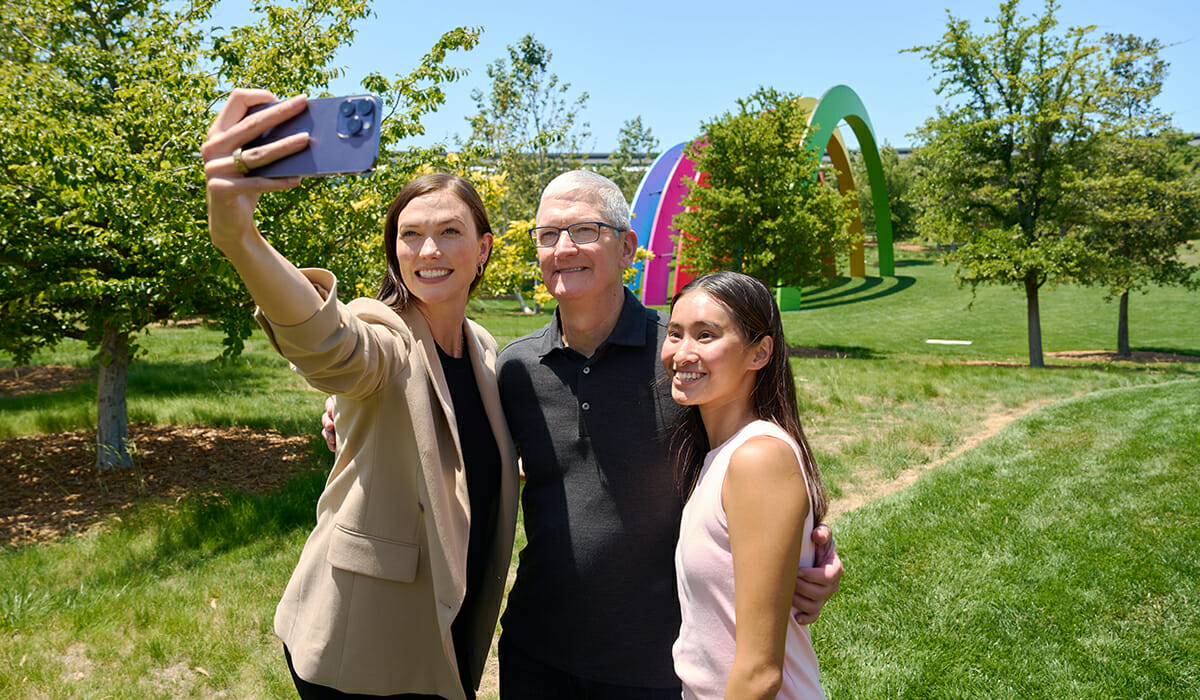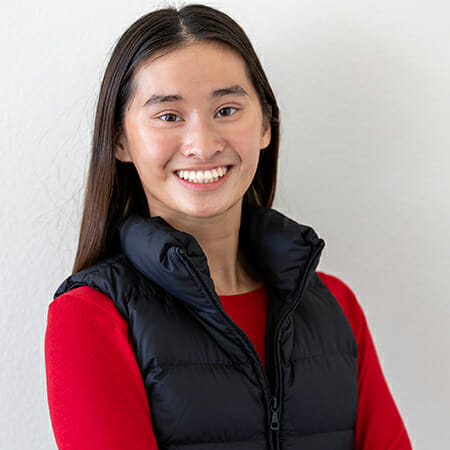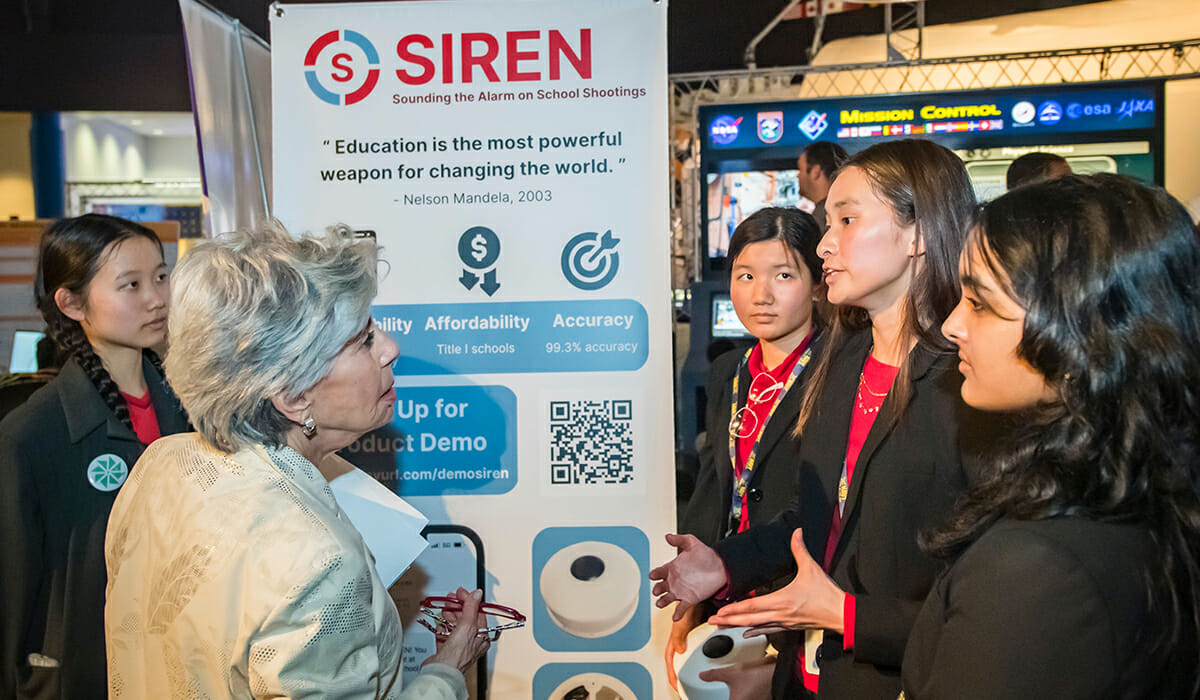Coder Creates: High School Senior Tackles STEM Gender Disparities and School Violence Through Computer Science

Meet Daily Point of Light Award honoree Rebecca Wang. Read her story, and nominate an outstanding volunteer or family as a Daily Point of Light.
Amidst the stressful college application season, Rebecca Wang, a 17-year-old high school senior, has a lot of things to focus on. Aside from figuring out where she’ll be attending college, she’s a competitive swimmer and has been engaging in the sport since she was 10. She’s in the water so often, she jokes about the continual smell of chlorine that follows her wherever she goes.
Rebecca’s other passion is to create. Leaning into her support for gender equity and STEM, she runs Hydra Hacks, a hackathon she founded three years ago that has become one of the largest events of its kind for marginalized genders on the West Coast. It’s an idea she continued to run with when building her Dare to Dream app to encourage girls to get into STEM. She also serves as vice chair on the youth advisory council of the California Commission on the Status of Women and Girls (CCSWG). Her role involves promoting equitable access to STEM opportunities. In her spare time, she and three of her friends also created a patent-pending AI device to reduce response time in school shootings by providing a map of the school with the location of detected gunfire to police, students and staff. They’re in the process of securing funding to scale it up.
Wherever she ends up finding her college dream, Rebecca Wang will no doubt continue to work for the betterment of her community. And, of course, continue to create.

What inspires you to volunteer?
I want to contribute to positive change, to address critical issues in the world, like gender inequality and gun violence and STEM accessibility. I believe my generation has the power to create a better future. Every day I take action in small and big ways, whether it’s helping a friend or mentoring girls in STEM. These small acts chip away at larger problems. My end goal is to inspire others to join in, because together we can cultivate a more just, peaceful and equitable world.
How did you become interested in coding, and how did you learn how to do it?
In 2020, I entered the world of computer science through an untraditional path. I learned through workshops at a hackathon, which is a 24-hour marathon of learning and coding projects. And despite entering without any prior coding experience, I built a website on financial literacy and won a prize sponsored by Capital One.
But I became aware of the gender disparities within the tech industry, whether it was through subtle microaggressions or being one of the five girls at the event. And a week later, I started Hydra Hacks.
As I worked more with technology, I realized that I also needed to work on policy. I saw an opportunity to be part of the inaugural Youth Advisory Council with the California Commission on the Status of Women and Girls and applied. Later on, I was elected as the vice chair. Now, I have the opportunity to work alongside high school- and college-aged women to advise state-appointed commissioners on legislation regarding promoting gender equity and education for all of California’s girls and women.
Describe your volunteer role with Hydra Hacks and CCSWG.
I founded Hydra Hacks, a hackathon for marginalized genders. Hydra Hacks aims to inspire technological innovation and to create a lasting impact. To date, I’ve organized three hackathons and eight events, uniting over 5,000 students from historically underrepresented backgrounds in technology, particularly focusing on high school girls. And I’ve collaborated with over 30 corporate sponsors including Google and Jane Street to secure funding, mentors and laptops for these events. I’ve devoted almost 800 volunteer hours for Hydra Hacks over the past three years.
For CCSWG Youth Advisory Council, I compile research on period poverty and the inaccessibility to STEM resources for girls, then propose changes to influence policy conversations in meetings to 17 state-appointed commissioners.
Tell us more about SIREN and your Dare to Dream app.
Like many of my peers, I’ve been involved in school shooting threats. The issue of gun violence in a supposedly safe place of learning prompted me and three of my friends to develop a device to detect gunshots, reduce response times and improve communication between police, school staff and students.
It started out as a side project, and we later applied to competitions in order to gain funding and media exposure, in hopes of scaling our product. We won the Conrad Spirit of Innovation Challenge, and in less than three weeks, we’ll be in Washington for the T Mobile Challenge.
I started the Dare to Dream app in January. I originally wanted to write it as a children’s book in order to inspire girls to code. It would feature historical and contemporary trailblazers. But mid-process, I realized that creating an app would be more beneficial and would increase accessibility for users worldwide.
So, I did that and submitted it to Apple’s Swift Student Challenge. Luckily, I won and had the opportunity to present it to Apple CEO Tim Cook and Karlie Kloss who founded one of the first coding camps I went to.

What’s been the most rewarding part of your work?
I think seeing the impact of my workshops and innovations on one or thousands of students is so rewarding. For example, when I was pitching SIREN at the NASA Space Center in Houston with my team, there were groups on field trips all the way from Maine, Virginia and California. It was inspiring to see their message for us and to have their support.
What have you learned through your experiences as a volunteer?
Volunteering is a lot about uplifting others and allowing others to uplift you as well. It’s a two-way street, and we both gain satisfaction and something for our self-journey from it.
How have you seen your work affect your community?
Right now, I’m working on increasing STEM accessibility to under-resourced girls in my community. I’m going to middle and elementary schools to tell them about events like Hydra Hacks and opportunities like coding camps that are tailored to their age where they can come in, get a free computer and leave with an amazing experience and a newfound skill set. That’s what makes me smile. And that’s what makes me want to continue to volunteer and organize.
Tell us about future partnerships, programs or events that you are excited about.
I’m looking forward to attending a woman empowerment conference later this month in San Francisco. Other than that, I’m looking to organize a winter conference for Hydra Hacks that will feature a panel of inspirational women in technology. We had around 500 people attend last year.
Why is it important for others to get involved in causes they care about?
I think it’s extremely important. Our generation is facing so many problems that we have never seen before. And also, past problems that still exist. More than anything right now, we need to find one thing we’re passionate about, volunteer and solve it. Even if it’s a small or crazy idea. Everything makes a difference.
Do you want to make a difference in your community like Rebecca? Find local volunteer opportunities.
